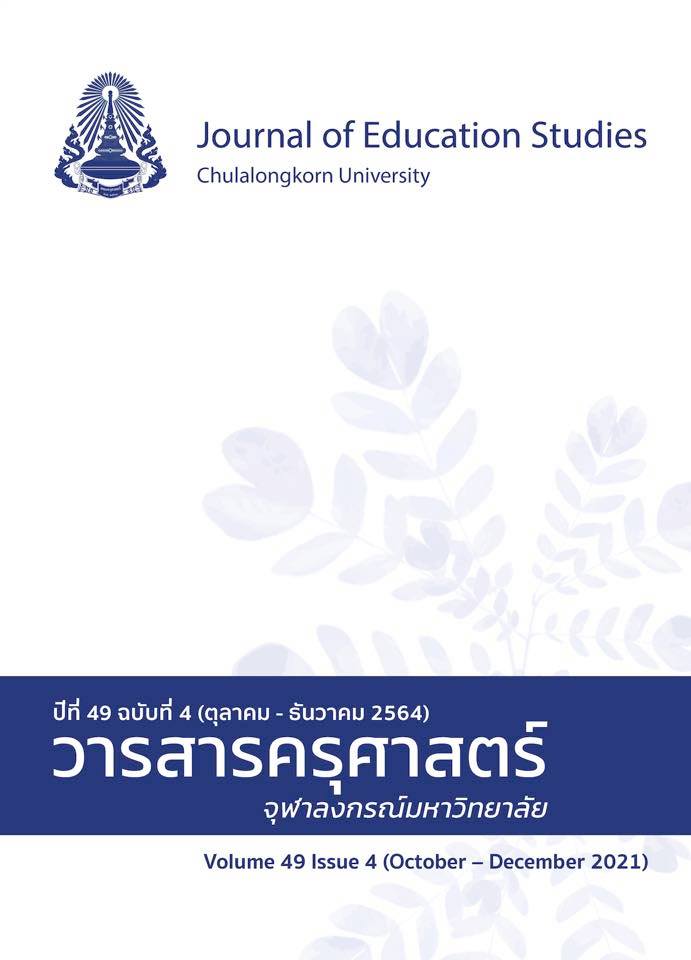Development of a Reflective Ability Assessment Package to Enhance Pre-service Teachers’ Level of Reflection
DOI:
https://doi.org/10.14456/educu.2021.69Keywords:
reflective practice, pre-service teacher, assessing level of reflective thinkingAbstract
Nowadays, teachers should be equipped with reflective thinking ability; the ability to contemplate one past actions to improve one’s teaching practice. With this consideration in mind, this study was conducted with two purposes, 1) to develop a reflective ability assessment tool and 2) to investigate the effectiveness of the assessment package on pre-service teachers’ level of reflection. Educational research and development design was employed to develop the reflective ability assessment package. The participants of this study included four English-majored pre-service teachers who were attending the 2nd-semester teaching practicum of the academic year 2011. Data received from implementing the reflective ability assessment was analyzed qualitatively and quantitatively. The findings revealed that 1) reflective ability assessment package consisted of three main components; teaching video clips as a trigger, guiding questions as an idea potential reinforcement or scaffold, and quality assessment; and 2) the improvement of pre-service teachers’ level of reflection was divided into two groups; positive development group and neutral development group.
References
Calandra, B., Brantley-Dias, L., Lee, J. K., & Fox, D. L. (2009). Using video editing to cultivate novice teachers' practice. Journal of Research on Technology in Education, 42(1), 73-94.
Cavanagh, M., & Prescott, A. (2011). The growth of reflective practice among three beginning secondary mathematics teachers. Asia-Pacific Journal of Teacher Education, 38(2), 147-159.
Chinokul, S. (2015). Classroom observation: A self-study of a language teacher educator supervising pre-service teachers. Journal of Education Studies: Chulalongkorn University, 43(3), 1-22.
Chong, S., Ling, L. E., & Chuan, G. K. (2011). Developing student teachers' professional identities: An exploratory study. International Education Studies, 4(1), 30-38.
Clark, D. (2003). Instructional system design-analysis phase. Computing in Childhood Education, 1, 3-27.
Dewey, J. (1933). How we think. Prometheus Books.
Freese, A. R. (2006). Reframing one's teaching: Discovering our teacher selves through reflection and inquiry. Teaching and Teacher Education, 22, 100-119.
Gibbs, G. (1988). Learning by doing: A guide to teaching and learning methods. The University of Gloucestershire. http://www2.glos.ac.uk/gdn/gibbs/
Good, J. M., & Whang, P. A. (2002). Encouraging reflection in preservice teachers through response journals. The Teacher Educator, 37(4), 254-267.
Hatton, N., & Smith, D. (1995). Reflection in teacher education: Towards definition and implementation. Teaching and Teacher Education, 11(1), 33-49.
Hillman, S. L., Bottomley, D. M., Raisner, J. C., & Malin, B. (2000). Learning to practice what we preach: Integrating elementary education method course. Action in Teacher Education, 22(1-9).
Hobbs, V. (2007). Faking it or hating it: Can reflective practice be forced? Reflective Practice, 8(3), 405-417.
Kember, D., McKay, J., Sinclair, K., & Wong, F. K. Y. (2008). A four-category scheme for coding and assessing the level of reflection in written work. Assessment & Evaluation in Higher Education, 33(4),
369-379.
Khayankij, S. (2015). Contemplative observation as a tool for self-reflection enhancement of early childhood graduate students. Journal of Education Studies, Chulalongkorn University, 43(3),
23-38.
Lai, G., & Calandra, B. (2007). Using online scaffolds to enhance preservice teachers' reflective journal writing: A qualitative analysis. International Journal of Technology in Teaching and Learning, 3(3), 66-81.
Lee, I. (2007). Preparing pre-service English teachers for reflective practice. ELT Journal, 61(4), 321-329.
Mason, J. (2012). Scaffolding reflective inquiry-enabling why-questions while e-learning. Research and Practice in Technology Enhanced Learning, 7(3), 175-198.
Perez, L. M. (2011). Teaching emotional self-awareness through inquiry-based education. Early Childhood Research & Practice, 13(2), n2.
Rich, P. J., & Hannafin, M. (2009). Video annotation tools: Technologies to scaffold, structure, and transform teacher reflection. Journal of Teacher Education, 60(1), 52-67.
Schweiker-Marra, K., Holmes, J. H., & Pula, J. J. (2003). Training promotes reflective thinking in preservice teachers. Delta Kappa Gamma Bulletin, 70(1), 55-61.
Smyth, J. (1993). Reflective practice in teacher education and other professions. Learning in the field: The current face of practical experience in professional preparation [Paper presentation]. The 5th National Practicum Conference, Sydney, Australia.
Ward, J. R., & McCotter, S. S. (2004). Reflection as a visible outcome for preservice teachers. Teaching and Teacher Education, 20, 243-257.
Downloads
Published
How to Cite
Issue
Section
License

This work is licensed under a Creative Commons Attribution-NonCommercial-NoDerivatives 4.0 International License.




